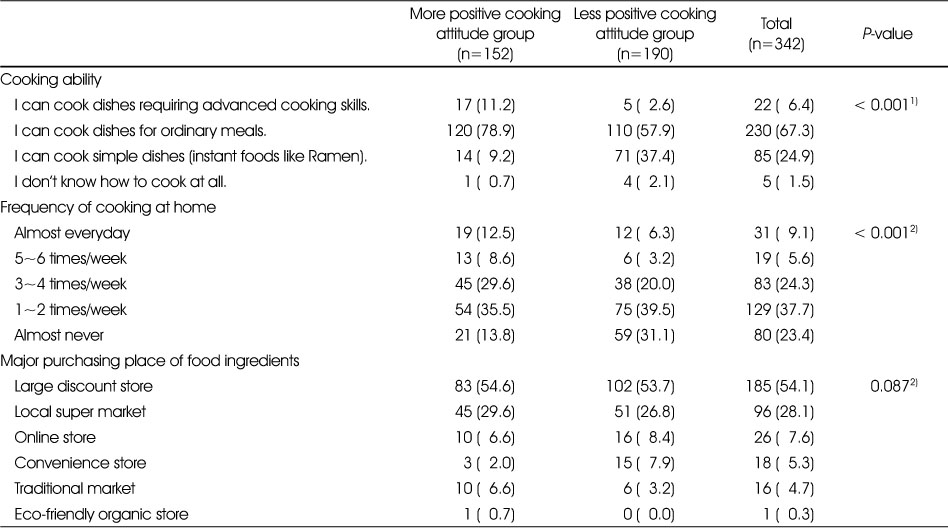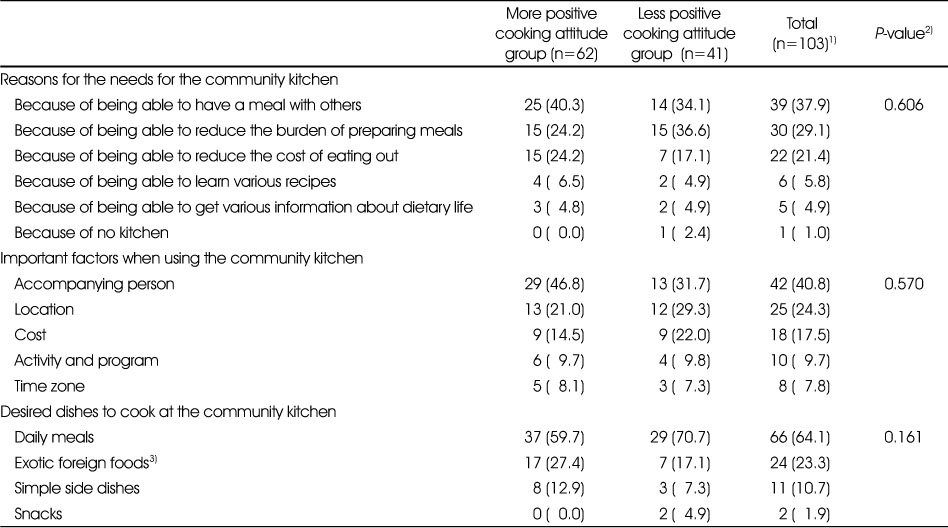Articles
- Page Path
- HOME > Korean J Community Nutr > Volume 25(3); 2020 > Article
- Research Article
- ary Characteristics and Needs for Community Kitchens among Young Adults of Single-person Households in Seoul according to the Cooking Attitude
- Mina Yang, Kana Asano, Nalae Kim, Jihyun Yoon
-
Korean Journal of Community Nutrition 2020;25(3):204-213.
DOI: https://doi.org/10.5720/kjcn.2020.25.3.204
Published online: June 30, 2020

2Senior Researcher, CJ Cheiljedang Food R&D Institute, Gyeonggi-do, Korea

3Master Student, Department of Food and Nutrition, Seoul National University, Seoul, Korea

4Professor, Department of Food and Nutrition, Seoul National University, Seoul, Korea

-
Corresponding author:
Jihyun Yoon,
Email: hoonyoon@snu.ac.kr
- 306 Views
- 2 Download
- 3 Crossref
- 0 Scopus
Abstract
Objectives
This study examined the dietary characteristics and needs for community kitchens among young adults of single-person households in Seoul according to the cooking attitude.
Methods
During April 2018, an online survey was conducted on young adults of singleperson households in their 20s and 30s residing in Seoul. The respondents were classified into the more positive cooking attitude group (More Positive Group; n=152, mean=4.11) and the less positive cooking attitude group (Less Positive Group; n=190, mean=3.03) based on the mean score (3.51) of the 4-item 5-point Likert scales measuring the cooking attitude. The responses of the two groups were compared.
Results
Approximately 90% of the More Positive Group had the cooking ability to prepare ordinary meals or more advanced cooking skills, whereas only 61% of the Less Positive Group had such skills. Approximately a half of the More Positive Group cooked at home three times a week or more; only 30% of the Less Positive Group did so, and more than 30% of the group seldom cooked. The More Positive Group had higher mean scores in the levels of satisfaction with dietary life and care for food safety and nutrition than the Less Positive Group. Approximately 30% of all the respondents expressed their needs for community kitchens. The most frequently answered reason for such needs was “being able to have a meal with others”.
Conclusions
The young adults of single-person households with a more positive cooking attitude possessed a higher cooking ability, cooked more often, and cared more about food safety and nutrition than those with a less positive cooking attitude. There were moderate needs for community kitchens among young adults of single-person households living in Seoul. Therefore, societal efforts to improve their cooking attitude would be meaningful for improving their quality of dietary life. Cooking lessons or social dining programs based on community kitchens could be an option.
Published online Jun 30, 2020.
https://doi.org/10.5720/kjcn.2020.25.3.204
Dietary Characteristics and Needs for Community Kitchens among Young Adults of Single-person Households in Seoul according to the Cooking Attitude
Abstract
Objectives
This study examined the dietary characteristics and needs for community kitchens among young adults of single-person households in Seoul according to the cooking attitude.
Methods
During April 2018, an online survey was conducted on young adults of single-person households in their 20s and 30s residing in Seoul. The respondents were classified into the more positive cooking attitude group (More Positive Group; n=152, mean=4.11) and the less positive cooking attitude group (Less Positive Group; n=190, mean=3.03) based on the mean score (3.51) of the 4-item 5-point Likert scales measuring the cooking attitude. The responses of the two groups were compared.
Results
Approximately 90% of the More Positive Group had the cooking ability to prepare ordinary meals or more advanced cooking skills, whereas only 61% of the Less Positive Group had such skills. Approximately a half of the More Positive Group cooked at home three times a week or more; only 30% of the Less Positive Group did so, and more than 30% of the group seldom cooked. The More Positive Group had higher mean scores in the levels of satisfaction with dietary life and care for food safety and nutrition than the Less Positive Group. Approximately 30% of all the respondents expressed their needs for community kitchens. The most frequently answered reason for such needs was “being able to have a meal with others”.
Conclusions
The young adults of single-person households with a more positive cooking attitude possessed a higher cooking ability, cooked more often, and cared more about food safety and nutrition than those with a less positive cooking attitude. There were moderate needs for community kitchens among young adults of single-person households living in Seoul. Therefore, societal efforts to improve their cooking attitude would be meaningful for improving their quality of dietary life. Cooking lessons or social dining programs based on community kitchens could be an option.
Table 1
Cooking attitude of young adults of single-person households (n=342)
Table 2
General characteristics of survey respondents according to cooking attitude
Table 3
Cooking ability and behavior of young adults of single-person households according to cooking attitude
Table 4
Frequency of eating out and HMR2) use of young adults of single-person households according to cooking attitude
Table 5
Perception on dietary life of young adults of single-person households according to cooking attitude
Table 6
Needs for community kitchens of young adults of single-person households according to cooking attitude
Table 7
The opinions regarding community kitchens of young adults of single-person households according to cooking attitude
Acknowledgments
This work was supported by The Research Institute of Human Ecology, Seoul National University.
References
-
Statistics Korea. Press release 2018 population and housing census [internet]. Statistics Korea; 2019 [cited 2020 May 10].Available from: http://kostat.go.kr/portal/eng/pressReleases/8/7/index.board.
-
-
Lee KI, Hwang YJ, Ban HJ, Lim SJ, Jin HJ, Lee HS. In: Impact of the growth of single-person households on the food market and policy tasks. Korea Rural Economic Institute; 2010 Oct.Report No. R762.
-
-
Park JH. Single-person households' lifestyle in Korea and Japan. Seoul Econ 2011;10:14–22.
-
-
Heo YK, Sim KH. Dietary attitude of single households in metropolitan areas. Korean J Food Nutr 2016;29(5):735–745.
-
-
Kim SY, Kim SY, Kim MA, Kim YK, Park KS, Park SY, et al. In: A case study of community kitchen in Seoul: connection of field and policy. The Seoul Institute; 2018.Report No. 2017-CR-09-03.
-
-
Fridman J, Lenters L. Kitchen as food hub: adaptive food systems governance in the city of Toronto. Local Environt 2013;18(5):543–556.
-
-
Vestbro DU. Saving by sharing-collective housing for sustainable lifestyles in the Swedish context; Proceeding of The 3rd international conference on degrowth for ecological sustainability and social equity; 2012 Sep; Venice. pp. 1-13.
-
-
Kwon SJ, Kim MR, Son JM, Kim JH, Lee YK, Choi KS, et al. In: Meal management. Seoul: Powerbook; 2011. pp. 13-15.
-
-
Kim YA, Lee BC, Youn HW. A study on single people's satisfaction of convenience foods and repurchase intention according to food-related lifestyle. J Tour Leis Res 2014;26(5):433–452.
-
-
Lee SL, Lee SJ. The effect of dietary behavior and dietary life style on dietary satisfaction in single-person households. Consum Cult Res 2016;19(3):115–133.
-
-
Lee JS, Oh JR. A study on the effects of single-person household lifestyle, inhuman-relationship, individual values and simplicity of meals on an act of eating alone; Proceeding of 2017 Fall conference of the Korea Entertainment Industry Association; 2017 Nov 3; Gwangju. pp. 47-52.
-
-
Park H, Lee S. In: Scientific survey methods changing the world 2017. Seoul: Changgisa; 2017. pp. 206-212.
-
-
Yoon GS. A study on the recognition about food preparation and cooking ability of college students majoring in food & nutrition and others. Korean J Soc Food Cook Sci 2001;17(6):639–647.
-
-
Choe JS, Ji SM, Paik HY, Hong SM. A study on the eating habits and dietary consciousness of adults in urban area. J Korean Soc Food Sci Nutr 2003;32(7):1132–1146.
-
-
Smith LP, Ng SW, Popkin BM. Trends in US home food preparation and consumption: analysis of national nutrition surveys and time use studies from 1965–1966 to 2007–2008. Nutr J 2013;12(1):45
-
-
Lee KI, Kim SH, Heo SY, Choi JH, Park IH. In: 2018 Basic analysis report on food consumption behavior survey. Korea Rural Economic Institute; 2018 Dec.Dec. Report No. 16-2018.
-
-
Choi JS, Paulsson J. Evaluation of common activity and life in Swedish cohousing units. Int J Hum Ecol 2011;12(2):133–146.
-
-
Oh J, Choi JM. A study on the demand characteristics and influence factors affecting shared house in Korea. Korean Hous Assoc 2014;25(3):63–72.
-
-
Tarasuk V, Reynolds R. A qualitative study of community kitchens as a response to income-related food insecurity. Can J Diet Pract Res 1999;60(1):11–16.
-
-
Thomas HM, Irwin JD. Cook It Up! A community-based cooking program for at-risk youth: overview of a food literacy intervention. BMC Res Notes 2011;4(1):495
-

 KSCN
KSCN








 Cite
Cite


